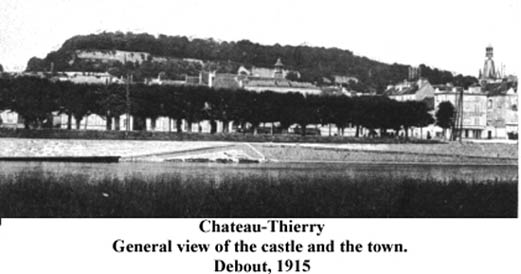
Jehanne la Pucelle
A mini-biography
(Joan the Maid, commonly called Joan of Arc in English)
Compiled from many sources by Steven R. Kanehl
Part 6
Thursday, the 21st
– The group departs Reims for Corbeny.
Saturday, the 23rd
– They are at Soissons until the 28th.
Friday, the 29th
– They are at Chateau-Thierry.
Sunday, the 31st
– The King, at Jehanne’s request, accords remission in perpetuity of all taxes or other levies to the villages of Greux and Domremy, and that their taxation-demands henceforth appear cancelled by the words "Neant, la Pucelle" written in the margin. This privilege remained in effect for over 350 years, rescinded only during the French resolution.Jehanne is always concerned with spiritual values. There is a story called the King’s boon, although it is not known when this occurred. As the King granted tax relief, at Jehanne’s request, for Greux and Domremy on the 31st, I think this event might have occurred around the same time. Jehanne asks Charles for a present, the kingdom of France itself. Charles, astonished, gives it to her after some hesitation, and she accepts. She asks that the act be solemnly drawn up and read by the king’s four secretaries. Jehanne says, "Here you see the poorest knight in his kingdom." And a little later, in the presence of the same group, acting as mistress of the kingdom of France, she puts the kingdom into the hands of all-powerful God. Then, at the end of some moments more, acting in the name of God, she invests Charles with the kingdom of France, and she wishes a solemn act be drawn up in writing of all of this. These sentiments, that God is the King of France, and has appointed Charles as His earthly lieutenant, have been expressed several times in the past in her various letters.
August 1429
The French begin a slow journey away from Reims on a southern path, parallel to Paris. It is unclear as to Charles intentions; does he intend to retreat as king back to the Loire, or will he travel to Paris?
Monday the 1st
– Jehanne and the group travel south and camp at Montmirail.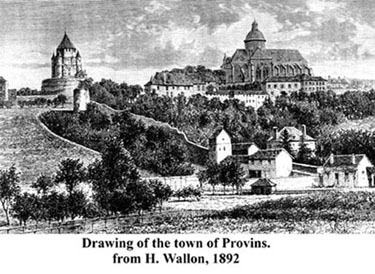
Tuesday the 2nd
– Jehanne continues south and goes to Provins. A heavily fortified town, they none the less submit to Charles and offer generous provisions. Rene of Anjou, the duke of Bar, joins the French army.
Thursday the 4th
– Jehanne continues south to Nagis-en-Brie.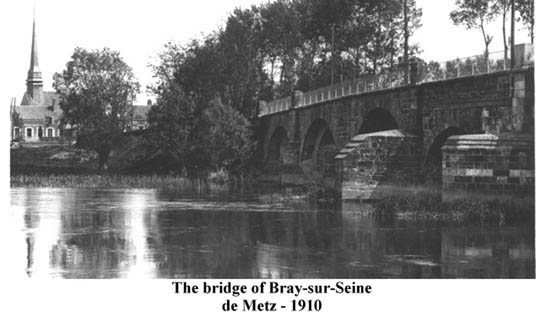
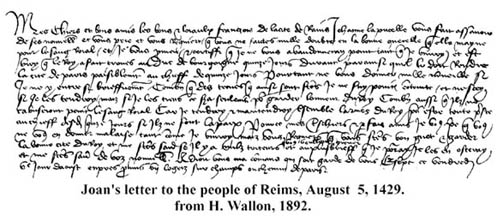
Friday the 5th
– Jehanne travels south to Bray located on the north bank of the Seine. Jehanne writes a letter to the citizens of Reims expressing distrust of the 15-day truce made between Charles and the Duke of Burgundy. The Duke promises to surrender Paris to Charles at the end of the 15 days. He intends to do no such thing, and instead he and the English use the 15 days to reinforce the defenses of Paris. Jehanne tries to be loyal to Charles and says she may not keep the truce, but if she does, it is only to preserve the King’s honor.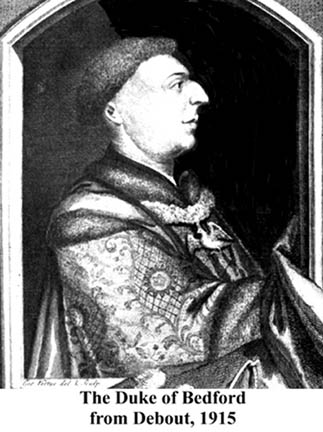
Sunday the 7th
– The English hold the bridge needed to cross the Seine. Jehanne and the captains are secretly glad and they must now go northwest to Coulommiers (now in the direction of Paris). The Duke of Bedford addresses a personal letter to Charles. He challenges Charles to a battle and insults him by calling him not a true king of France, a murderer (part of the assassination of Jean the Duke of Burgundy in 1420), the cause of all distress to the French people, and insults Jehanne calling her a "disorderly woman dressed as a man" who has been his principal helper in seducing his ignorant people. Charles takes no action as to any of these insults.
Wednesday the 10th
– Jehanne goes to La Ferte-Milon (northeast of Paris).
Thursday the 11th
– The group is at Crepy-en-Valois (northeast of Paris).
Friday the 12th
– They go to Lagny (east of Paris, but getting closer).
Saturday the 13th
– The group is at Dammartin and Thieux (northeast of Paris, but closer still). The English army is nearby and ordered in a good formation.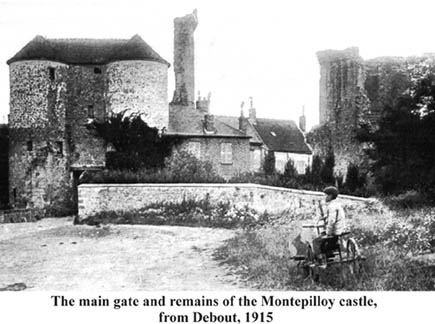
Sunday the 14th
– Jehanne is at Montepilloy 6 miles to the east of Senlis. The English are entrenched on a plain in a defensive position behind wooden spikes, ditches and wagons to protect them, as if forming a stockade. The French are on the heights of Montepilloy. A small skirmish breaks out with the English losing 10-12 men captured or wounded, including one captain, with no French casualties. Jehanne sleeps that night at a farm at Fourcheret.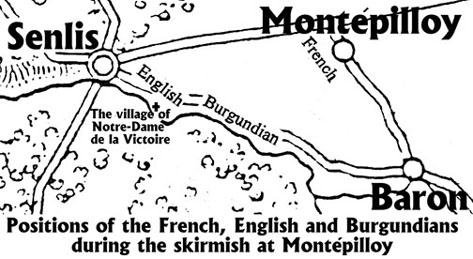
Monday the 15th
(the Feast of Assumption) – Jehanne is up at dawn, hears Mass and receives communion at a little church in Baron. The French advance, but the English do not move from their defenses. A few skirmishes break out, but no real battles take place. The day is very hot and dusty. The dust is so thick that often the troops cannot see each other, even though they are only several hundred yards apart. Jehanne rides up to the English stockade and strikes the wooden spikes with the pole of her banner, shouting out a challenge to the English to fight. They do not answer. Jehanne withdraws. She and Alencon try to taunt the English into a fight, even offering to withdraw so the English could group into battle formation. Still no answer. Night falls and the French go back to their camp.
Monday, the 16th
– The English withdraw to Senlis and then to Paris. The French obtain a technical victory, gaining possession of the land, but leaving the English troops intact to defend Paris.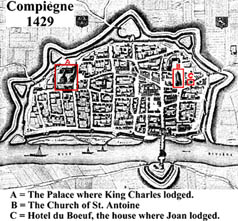
Wednesday the 18th
– Charles, Jehanne and the other captains go north to enter Compiegne. Jehanne is mounted on a white charger holding her banner. They are received at the Porte de Pierrefounds by the Captain of Compiegne, Guillaume de Flavy. Jehanne stays at the house of Jean le Feron on the Rue de Paris, known as the Hotel de Boeuf. The building no longer stands, but a commemorative plaque is found on the house now on this spot. Jehanne hears mass every day at the church of Saint Antoine, located across the square from the hotel.
Sunday the 22nd
– Jehanne writes a letter to the Count of Armagnac to respond to his inquiry as to which of the three popes then vying for authority should he follow. Jehanne says she is too busy to respond at present. She says that once she is Paris she will have learned from her counsel of her rightful and sovereign Lord, the King of the whole world. She will tell him the full truth about which of them he should believe. This letter is later used against her in her trial as evidence that she has placed herself above the authority of the church.
Monday the 23rd
– Jehanne leaves Charles at Compiegne and goes south to Senlis.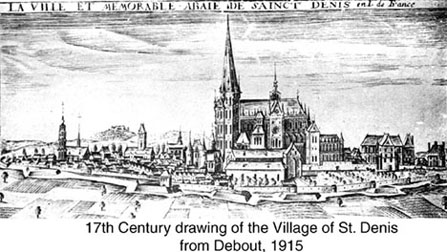
Thursday the 26th
– Jehanne travels south to Saint Denis, just outside on the north edge of Paris.
Sunday the 29th
– Jehanne attacks an important English observation outpost guarding Paris at Berthmont. She captures the tower.September 1429
Jehanne waits for more troops promised by Charles, who has lagged behind in Senlis. (The Duke of Alencon rides there on September 1 and again on the 5th to urge the king to come to Saint Denis so the attack can begin). Jehanne spends the first seven days of September engaged in various scouting missions and small attacks (sometimes two or three per day) at various points to test the defenses of Paris. At other times the walls were bombarded with gunpowder weapons.
Monday the 7th
– Charles arrives at Saint Denis. Jehanne spends the night at a vigil at the church located in Saint Denis, an old parish church of the village of La Chapelle.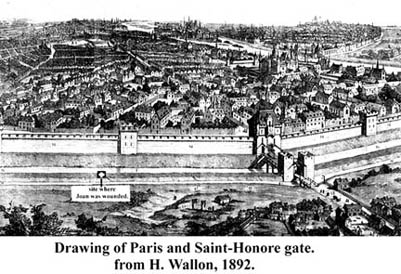
Tuesday the 8th
(Feast Day of the Virgin Mary) – Jehanne hears Mass and receives Holy Communion. The troops travel to Paris by way of the road that is now called Rue de La Chapelle and Rue du Faubourg Saint-Denis (now located within the city limits). An attack is made on Paris at the Porte Saint Honore. The walls are approximately 25 feet high, the largest and strongest in all of France and possibly in all of Europe west of Constantinople. The walls are topped with walkways and arrow slits. Every 125 yards or so stands a tall rectangular tower. Six gates are located throughout the walls surrounding the city. Surrounding the city is a moat (often filled with water depending upon the level of the Seine) almost 10 feet deep and about 100 feet in width in many places (though thought to be less wide at the place Jehanne attacked).Jehanne later testifies at her trial that she had no direct command from her voices to make this attack, but instead made the attack at the insistence of certain (unnamed) French noblemen. Several theories have been put forth regarding this attack. Some say that Jehanne was not entirely truthful at her trial to avoid criticism of her counsel. Others say this attack was merely an extensive of the various probing missions she had no doubt undertaken for the past week. A weakness in the city defenses may have been found and the French pounced on the opportunity to attack. Jehanne is criticized at her trial for attacking on an important feast day; she responds only be saying that is good to observe the feast days.
The attack lasts all day. The walls are bombarded by gunpowder weapons. Large bundles of sticks, carts and barrels are thrown into the moat as a makeshift bridge. Jehanne, banner in hand, leads the attack against the walls. Little progress is made. Just after sunset, between 6:30 and 7:00 p.m., Jehanne is wounded by a crossbow bolt in her thigh. Jehanne cries out to continue the attack more strongly. Her soldiers carry her out of the moat, despite her protests. They put her on her horse and retire to her tent in La Chapelle. Jehanne is heard to mutter, "By my staff, the place should have been taken."
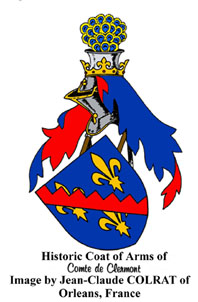
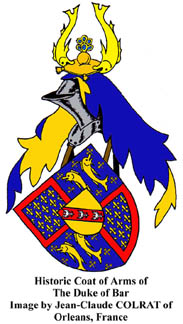
Wednesday the 9th
– Jehanne and the French awake, ready to resume the battle. Jehanne is encouraged by the defection of the count of Montmorency and his 50 to 60 cavalrymen. Jehanne sends for Alencon, and asks him to sound the trumpets and mount the horses to return to Paris. However, before they can depart, Rene of Anjou and Charles, count of Clermont, arrive with a message from King Charles. He orders an immediate meeting with Jehanne and Alencon. Jehanne is irritated at the delay, but becomes angry when Charles tells her that all further attacks are postponed until a council meeting of Charles top advisors can be held. A bridge that Alencon had built over the Seine to attack Paris from another direction is ordered to be destroyed. A council is held, and despite the objections of Jehanne, Alencon and others, it is decided to retreat. No doubt La Tremoille, (Charles chief advisor and always in favor of diplomacy) is behind the influence to call off the attack. Another treaty with the Duke of Burgundy had been made in which Charles promised that the siege of Paris would not be seriously undertaken.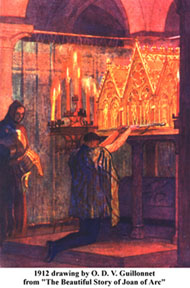
Saturday the 12th
– The army begins its retreat back to the Loire. Before she leaves Saint-Denis, a dispirited Jehanne places a suit of armor in the basilica of Saint-Denis as a votive offering in devotion to God for the victories He had given her so far. Some say this armor is the special suit of armor (the white armor, so named, because it was void of special designs often made in armor) made for her before the battle of Orleans; others say it is a suit of armor taken from a captured Burgundian.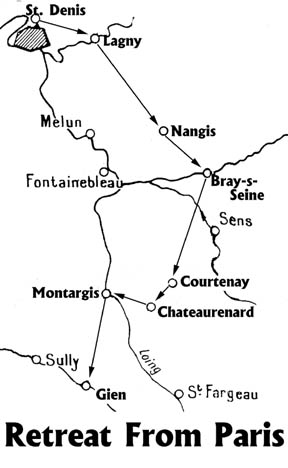
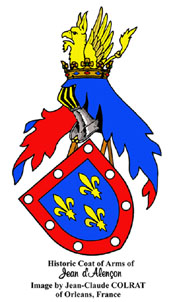 Monday the 21st – The group reaches Gien, having traveled back from Paris through Provins, Courenya, Chateaurenard and Montargis. The king dissolves the army. Alencon returns home to be with his wife; Jehanne will never see her "good duke" again. (Several months later Alencon is joined by Constable Richemont in a military operation against the English in Normandy. Alencon asks the king to allow Jehanne to join him, but the request is denied.)
Monday the 21st – The group reaches Gien, having traveled back from Paris through Provins, Courenya, Chateaurenard and Montargis. The king dissolves the army. Alencon returns home to be with his wife; Jehanne will never see her "good duke" again. (Several months later Alencon is joined by Constable Richemont in a military operation against the English in Normandy. Alencon asks the king to allow Jehanne to join him, but the request is denied.)
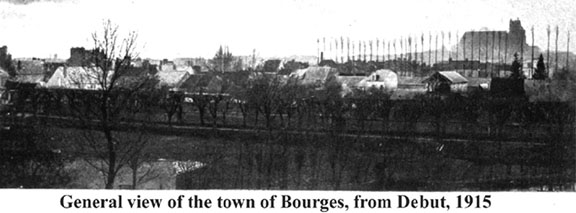
Jehanne is in Meung-sur-Yevre, Bourges and St. Pierre-le Moutier. She spends three weeks in Bourges as the guest of Marguerite La Touroulde. She is nearly 40 years old and her husband is Rene de Bouligny, the receiver-general (similar to Treasurer) for King Charles. While there, Jehanne and Marguerite attend church together and go to the public baths and sweating rooms (saunas?). Marguerite would later attest to Jehanne’s purity, charity and, that she hated dice (presumably for their overuse in the sin of gambling). She also attests that she observed Jehanne was a virgin (no one knows how she observed this) and her posterior was covered with calluses from horseback riding. Jehanne is quoted as saying "I am sent to comfort the poor and needy". Jehanne would laugh at the women of Bourges who bring their rosaries to her to touch, telling them "Touch them yourselves; they will benefit from your touch quite as much as mine."
Joan receives a visit from Catherine de La Rochelle. Brother Richard, whom she had met at Troyes, sent Catherine. Catherine claimed to have a vision each night of a White Lady covered in gold. The lady ordered her to go to the King to tell him he would discover hidden treasures, to pay his army. Jehanne receives her at Montfaucon-en Berry (since renamed Villequiers) some distance from Bourges, near Baugy. Jehanne keeps vigil for two nights without seeing the vision. She later writes a letter advised the king "the business of this Catherine is nothing but folly."